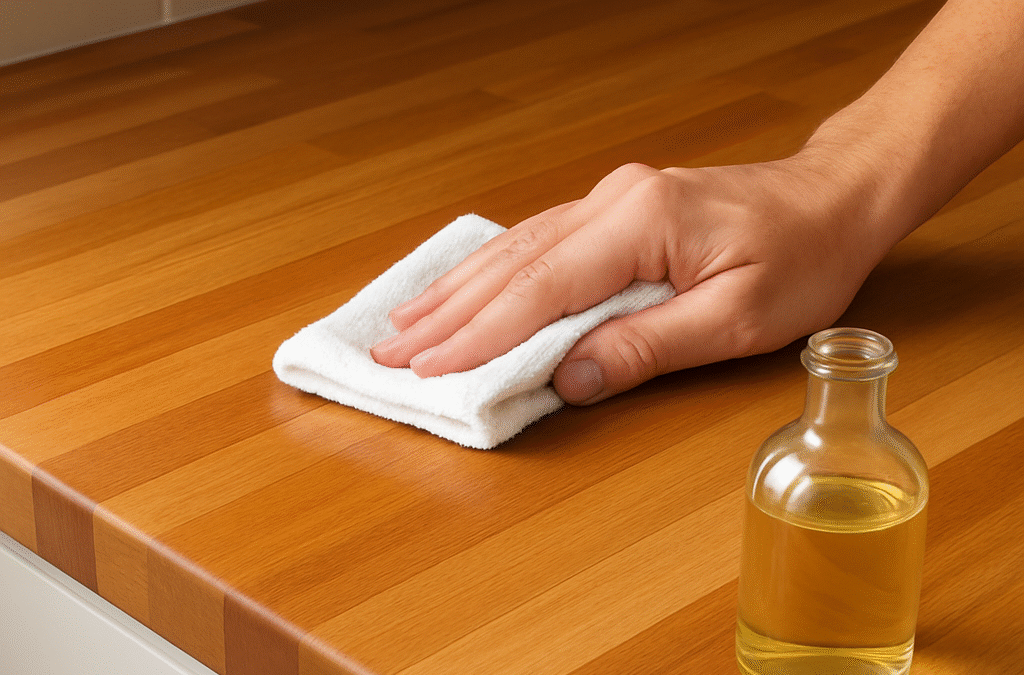Butcher block countertops bring warmth and natural beauty into the kitchen. They’re loved by home cooks, farmhouse design fans, and anyone who wants a surface that feels inviting and timeless. But here’s the catch — wood is porous. That means without proper care, butcher block can stain, warp, or even grow bacteria.
If you’ve ever worried about keeping your wooden counters clean and safe, you’re not alone. A study published in the Journal of Food Protection found that wood surfaces can harbor bacteria longer than stone or laminate if not maintained properly. But when cared for correctly, butcher block can last decades and even get more beautiful with age.
This guide explains how to clean and maintain butcher block countertops the right way. You’ll learn daily cleaning methods, stain removal, oiling and sealing schedules, and the key do’s and don’ts every homeowner should follow.
Key Takeaways
- Clean butcher block daily with mild soap and warm water.
- Avoid soaking wood or leaving standing water.
- Disinfect naturally with vinegar or lemon, but avoid harsh chemicals.
- Oil countertops every 3–4 weeks with food-safe mineral oil.
- Sand and reseal surfaces once or twice a year for long-term durability.
Why Do Butcher Block Countertops Need Special Care?
Unlike granite, quartz, or laminate, butcher block is made of real wood. Wood absorbs moisture, scratches easily, and reacts to temperature changes. That’s what gives butcher block its rustic charm — but it’s also what makes it vulnerable.
- Moisture risk: Too much water causes warping or swelling.
- Stains: Wine, oils, or sauces can soak in quickly.
- Bacteria: If not cleaned properly, wood can trap germs in its pores.
Still, when properly maintained, butcher block is safe and durable. In fact, research from the University of Wisconsin showed that bacteria on wood cutting boards often die off faster than on plastic surfaces because wood naturally draws moisture away.
What Is the Best Daily Cleaning Routine for Butcher Block?
Caring for wood starts with a simple daily routine.
Step-by-Step Daily Cleaning
- Wipe crumbs and debris with a dry cloth.
- Mix mild dish soap with warm water.
- Dampen a sponge or cloth (never soak it).
- Wipe the surface gently.
- Rinse with clean water.
- Dry immediately with a towel.
💡 Pro tip: Always dry thoroughly. Standing water is the number one enemy of butcher block.
How Do You Disinfect Butcher Block Countertops?
Butcher block shouldn’t be disinfected with bleach or harsh chemicals, since they strip the wood and leave residues unsafe for food. Instead, try these natural options:
- Vinegar spray: Mix equal parts white vinegar and water. Spray lightly, wipe, and dry.
- Lemon and salt scrub: Sprinkle coarse salt on the surface, then rub with half a lemon. Rinse and dry. This method removes odors and surface bacteria.
- Hydrogen peroxide (3%): For deeper sanitizing, apply with a cloth and wipe after a few minutes.
👉 These options are food-safe and gentle on wood while still effective.
How Do You Remove Stains from Butcher Block?
Stains are inevitable with wood, but most can be removed.
| Stain Type | Cleaning Method | Avoid |
|---|---|---|
| Wine or Coffee | Sprinkle baking soda, rub with damp cloth. For deeper stains, apply lemon + salt scrub. | Bleach (harsh on wood fibers) |
| Oil or Grease | Apply cornstarch, let sit 15 minutes to absorb oil, then wipe clean. | Solvent-based cleaners |
| Water Rings | Rub with equal parts vinegar + olive oil. | Prolonged scrubbing (damages finish) |
| Dark Stains/Mildew | Sand lightly with fine-grit sandpaper, then reseal. | Harsh chemicals |
💡 If stains persist after two treatments, sanding is often the best fix.
How Often Should You Oil Butcher Block?
Oiling keeps wood hydrated and resistant to stains. Without it, wood dries out, cracks, or absorbs moisture.
- Frequency: Every 3–4 weeks for active kitchens.
- Product: Use food-safe mineral oil or a butcher block conditioner with beeswax.
How to Oil Butcher Block
- Clean and dry the surface thoroughly.
- Pour mineral oil onto a clean cloth.
- Rub in the direction of the grain.
- Let oil soak in for several hours (overnight is best).
- Wipe away excess.
According to This Old House, oiled butcher block can last over 20 years, while neglected wood may need replacing in under 5.
How Do You Reseal or Refinish Butcher Block?
Every 6–12 months, butcher block needs a deeper refresh.
Sealing Options
- Beeswax/mineral oil blend – Best for food prep areas.
- Polyurethane – Stronger protection, but not always food-safe.
- Water-based sealers – Safer and easier to apply, but may need more frequent reapplication.
Refinishing Process
- Sand the surface with fine-grit sandpaper to remove stains and scratches.
- Clean away dust with a vacuum or damp cloth.
- Reapply oil or sealant evenly.
- Allow to cure for 24 hours before use.
What Mistakes Should You Avoid with Butcher Block?
Many homeowners shorten the life of butcher block by accident. Avoid these mistakes:
- Don’t let water pool. Always wipe spills right away.
- Don’t cut directly on the counter. Use cutting boards to avoid knife marks.
- Don’t use bleach or ammonia. They dry and damage wood fibers.
- Don’t place hot pans directly on wood. Use trivets to prevent burns.
- Don’t skip oiling. Dry wood is prone to cracking and staining.
FAQs
Can you use Clorox wipes on butcher block?
Not recommended. Most contain bleach or harsh chemicals unsafe for wood.
What’s the best homemade butcher block cleaner?
Mix vinegar and water for daily disinfecting. Add lemon for odor control.
How do you fix cracks in butcher block?
Small cracks can be filled with food-safe wood filler and resealed. Larger cracks may require sanding or replacement.
Is butcher block safe for food prep?
Yes, when properly cleaned and oiled. Always disinfect after handling raw meat.
How long do butcher block countertops last?
With regular oiling and sealing, butcher block can last 20 years or more.
Quick Butcher Block Care Checklist
- Clean daily with soap + water.
- Disinfect weekly with vinegar or lemon scrub.
- Oil every 3–4 weeks with mineral oil.
- Sand and reseal yearly.
- Wipe spills immediately.
- Use trivets, coasters, and cutting boards.
Final Thoughts
Butcher block countertops are a kitchen classic — warm, inviting, and durable when cared for correctly. The secret lies in balance: clean gently every day, disinfect safely, oil monthly, and reseal yearly. Avoid harsh chemicals and standing water, and your counters will stay beautiful for decades.
Caring for wood may feel high-maintenance compared to stone, but it rewards you with a living surface that only gets richer with age. Treat butcher block as both a work surface and a piece of furniture, and it will remain the heart of your kitchen.

As the chief content writer, Hassan Al Sarker works as a professional kitchen-based content creator at Kitchen Liker.
In addition to reviewing the content published on Kitchen Liker, he ensures that it is accurate, relevant, and helpful. As a result, all the reviews and information published at Kitchen Liker are neutral and userfriendly.
Hassan Al Sarker has a bachelor’s degree in Hotel and Tourism Management From the Newyork University. Before joining Kitchen Liker, he was a contributor at Kitchen Club, United States.

